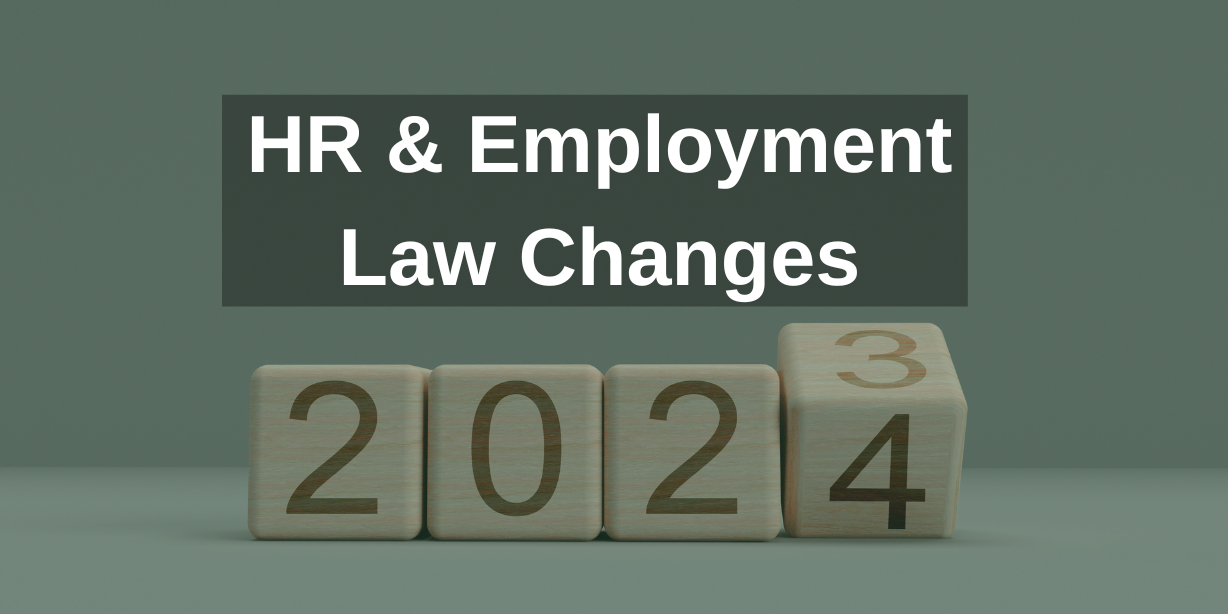2024 is set to be a big year for HR and employment law changes!
There are rumblings within our network that if a Labour Government is elected, the requirement to obtain 2 years service to pursue a general unfair dismissal claim will be completely eradicated or at least reduced to 1 year. Whilst we have no conclusive evidence of this, we will keep our ears to the ground and we recommend that you enter your details here to ensure that you are receiving our updates.
Until then, there are still a whole host of employment law changes which have come into effect recently, or which are set to be implemented in 2024.
October 2023 Change – Holiday Pay
In October the Supreme Court held that where there has been an on-going series of deductions of wages (including holiday pay paid at the incorrect rate), an employee should be able to link those together irrespective of whether there was a 3 month break between any deduction.
Whether a claim in respect of two or more deductions constitutes a claim in respect of a series of deductions is a question of fact. All relevant circumstances must be taken into account, including: their similarities and differences; their frequency, size and impact; how they came to be made and applied; what links them together, and all other relevant circumstances. Whether or not the deductions were more or less than three months apart is no longer relevant.
This means that any employers who are aware of an underpayment of holiday pay can no longer rely on a 3 month window to break the chain of on-going deductions. It is however, still limited to a general 2 year time frame and a further time limit of 3 months from the date of the last deduction to issue the claim initially.
October 2023 Change – Rehabilitation of Offenders
Section 193 of the Police, Crime, Sentencing and Courts Act 2022 came into force on 28 October 2023 and sets down new reduced times periods for criminal convictions to become spent. It also reduced the length of time that convictions are required to be disclosed to employers and although not strictly related to employment law, it is a further change to be aware of. More details can be provided upon request and employers should consider updating questionnaires which ask for convictions to be disclosed within a set number of years.
These changes do not affect roles where DBS checks are required.
October 2023 Change – Sexual Harassment Protections
It was confirmed in October 2023 that from October 2024 employers will have an enhanced obligation to prevent sexual harassment in the workplace. There will be a statutory duty to take REASONABLE steps to prevent sexual harassment. 
We predict that this will mean more than simply issuing a policy in a handbook. We are developing an e-training option for employers to be able to demonstrate:
a) all employees were trained on what sexual harassment was;
b) managers were trained on how to deal with sexual harassment complaints; and
c) all employees know how to raise a concern on their behalf or someone else’s.
January 2024 – Equality Act 2010 Amendments
From 1 January 2024 the following changes will be effective:
- Employees will have the right to claim indirect discrimination by association (to cover a person who does not hold the relevant protected characteristic but suffers the same disadvantage at the hands of the employer’s Provision, Criterion or Practice as those who do have the protected characteristic.
- An amendment to the definition of disability to consider an employee’s ability to participate in working life.
- An extension of direct discrimination to cover statements made about not wanting to recruit people with certain protected characteristics even where there is no active recruitment process ongoing and no identifiable victim.
- Confirmation that employment discrimination on grounds of breastfeeding falls under the protected characteristic of sex.
January 2024 – Proposed Changes
- To simplify holiday pay for part-year workers and those with irregular hours to permit a 12.07% calculation (we are delighted about this and predicted it here – scroll down to “Our Predictions”
- To permit carry over of annual leave where an employee could not take it due to family related leave.
- To limit the carry over of annual leave due to long term sickness to 18 months.
- To remove the additional working time obligations on employers to keep records of all working hours and rest breaks even where regular hours are worked.
- To reduce the obligation to elect TUPE representatives for a small business with less than 50 employees.
April 2024 – Increased to National Minimum Wage
The Government has confirmed that it will be increasing the minimum wage rates by the largest ever increase. 
The National Living Wage will now apply to all workers over 21 (instead of 23) and the increase from 1 April 2024 means that the new National Minimum Wage rates will be:
- 21 and over: £11.44
- 18-20: £8.60
- 16-17 and apprentices: £6.40
This is an average increase of £1.08 per employee per hour, so it’s certainly something for employers to forecast for now.
September 2024 – Proposed Changes
The Workers (Predictable Terms and Conditions) Act 2023 is expected to come into force in September 2024. It will definitely be coming into force as it has received Royal Assent.
The Act introduces a new statutory right for workers (including agency workers) to request a more predictable working pattern.
The process for making a request will follow a broadly similar pattern to that currently in place for flexible working requests in that requests must be made in writing and may be refused on one of a series of specified grounds. There are currently six listed in the Act, including the burden of additional costs, detrimental impact on the recruitment of staff or other aspects of the employer’s business, or there being insufficient work during the periods the worker has asked to work.
ACAS has launched a consultation to assist it to draft a Code of Practice on this issue. It’s certainly one for employers of agency workers or staff with irregular hours to keep an eye on. As soon as we hear more, we will publish it in our updates.
Undated 2024 Proposed Changes
We are waiting on exact details but the following changes are likely to come into force next year:
The Carer’s Leave Act
- One week of unpaid leave annually for employees caring for a dependent with long-term needs;
- The right will be a day 1 right
The Protection from Redundancy (Pregnancy and Family Leave) Act
This Act will protect employees who are pregnant or have returned from maternity leave within the past 9 months from being made redundant in certain situations. It will extend the protections that women on maternity leave currently have.
The Neonatal Care (Leave and Pay) Act
This legislation will grant parents of new-born babies who are hospitalised within the first 28 days of life an entitlement to Neonatal Leave and Pay if the baby stays in hospital for more than 7 days.
It is likely to mirror statutory maternity pay. It will be for a maximum of 12 weeks and is to be taken before or after maternity leave. There are many questions about how this will work in reality, including how it will work alongside Shared Parental Leave but for now, we do not have specific details.
Flexible Working Changes
Flexible working requests will be a day 1 right and employer’s will only have 2 months to respond to them (less than the current 3 months).
Employees will be able to make 2 requests rather than 1, per annum.
It will be imperative that job offers are drafted correctly to deal with future flexible working requests in a quick manner, speak to us to find out more.
Let us help cure your HR Headaches
Speak to Employment Law Solutions if you have any queries about your annual leave, current contract, or if you wish to make changes to your current contracts. A dedicated lawyer would love to review your current documentation for you, free of charge.
Employment Law Solutions have a solid base of Nurseries and early years settings within our client base and are in touch with the issues and HR headaches that you may be facing. We can help. Call us today or get in contact by email for a free consultation on the issues you may be facing in your early year’s settings.
Call us on 01270 781 006




